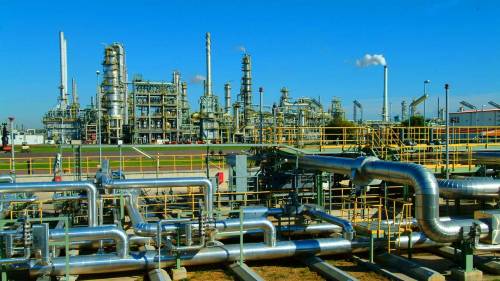
The fact that the proposed new refinery in Katsina State is private-sector driven makes it acceptable under a new thinking that the private sector should be involved in running refineries in Nigeria, especially, against the backdrop that the monopoly of refinery business in Nigeria through the corruptible state-owned NNPC has not worked. According to reports, the $2 billion private sector-driven petroleum refinery sited in Mashi, Katsina State is facilitated by Niger Republic, Nigeria’s neighbour to the north. The refinery, billed for completion in 2021, would have the capacity to produce 150, 000 barrels per day.
The refinery story came to light when Nigeria’s Minister of State for Petroleum Resources, Dr. Ibe Kachikwu and the Nigerien Minister of Energy, Foumakaye Gado, signed a Memorandum of Understanding (MoU) on the construction of the refinery at the Presidential Villa in Abuja.Mixed reactions have, however, trailed the development about the refinery, apparently, due to the ugly experience with Nigeria’s state-owned and operated refineries that have been mismanaged for so many decades.
While some stakeholders in the industry have commended the Federal Government for the initiative, others have expressed worries and dismissed it as a politically motivated project.Some of the concerns being expressed include how much crude oil is available from Niger; what size, complexity and scope is envisaged; what are the economics of the project like; who will own the refinery and what operating model is proposed? But these cloudy issues could be sorted out in good time.
On their part, the Pan Niger Delta Forum (PANDEF) have rejected the refinery on the ground that it could divert government’s attention from the refineries in Port Harcourt and Warri, which are, already neglected and ill-maintained.Some others think that government should have given gusto to the refinery in Kaduna that is performing far below installed capacity instead of embarking on a new one in the same northwest zone.
But Kachikwu has clarified the Katsina refinery as an extension of the refinery in Kaduna with great potentials. That clarification can’t be satisfactory since the Kaduna Refinery is a state-owned and the Katsina’s new one is a joint venture between two sovereign nations. The minister further noted that the new refinery started first from a perspective of Niger Republic wanting to build pipelines from Niger to the Kaduna refinery but was shut down because the asset quality of the crude from Niger was not the same with our own, hence, the decision to target the crude from Niger through a new refinery.
On the question of ownership, a Nigerian investor, Alhaji Ibrahim Zakari pledged to spearhead the takeoff of the refinery. He announced that his company, Blak Oil Energy Refinery had mobilised substantial part of the two billion dollars needed for the construction of the refinery.The funds, he explained, are coming from the USA, Canada, India and the Middle East. According to him, the refinery which would provide over 2, 500 direct employment and another 10, 000 indirect jobs to Nigerians, would take about five years to be completed.
It is heartening that after decades of failure, fresh ideas are coming into the refinery subsector. The Lekki, Lagos refinery under construction being funded by Nigeria’s foremost business tycoon, Aliko Dangote is spearheading the shift from state-owned refinery business that has failed the nation.With the Katsina refinery now in the pipeline, there is reason to believe that in no distant time, the problem of frequent fuel scarcity would be resolved, specifically in the northwest zone.
It is on this note that the promoters of the project are encouraged to pursue it with vigour. Proper feasibility should be carried out to ensure its completion and hitch-free operation.Having multiple refineries run by private concerns is advisable in Nigeria’s corrupt oil industry. The fact that the project is a partnership between Nigeria and Niger Republic sets it aside.
President Muhammadu Buhari, who doubles as Petroleum Resources Minister, sees this cooperation on crude oil export from Niger Republic as a “win-win” affair for both nations. But the concerns of other stakeholders from the other zones and PANDEF should not be dismissed. Specifically, attention should be paid to the countries’ four refineries. Last week, we recommended that the refineries should be sold to private investors. The initiative will not only provide a reliable market for the stranded crude from Niger Republic but also provide petroleum products for Nigeria as it pursues its aspiration to be self sufficient in petroleum products consumption.
In this regard, we need to stress a point that Niger Delta power elite should not just be agonizing over the Katsina refinery. They should be constructive in their strategic plans too. It is not altogether enough for stakeholders in the Niger Delta to lament the neglect of the refineries in the region. The people should be able to help themselves too by planning their own refineries. Whatever happened to the modular refineries dreams in the area!
For instance, why can’t the governors of the South-South join hands to build a refinery given the comparative advantage they have? So, until there are functional refineries that would put a stop to fuel importation, any effort to establish refineries anywhere in the country should be encouraged. Nigerians stand to gain, after all. It should not be forgotten that absence of functional refineries is largely responsible for the gridlock in Lagos as the 36 states and Abuja depend on only the two Lagos Sea Ports in Apapa to convey imported products to all parts of the country.
Despite all the misgivings, we should be broadminded in building an elite consensus that it is time for private companies to operate our refineries for purposes of efficiency and productivity as in other countries. As we noted here last week, that is the only way the scam called TAM (turn-around maintenance) of the old four refineries will be a thing of the past.
END

Be the first to comment